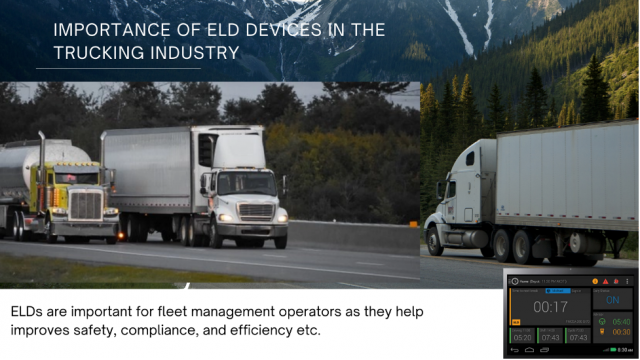No doubt, electronic logging devices are an integral part of the trucking industry. The devices are vital for fleet management operations not just because they are needed by law, but mostly because they promote safety and compliance.
ELDs provide Importance to both carriers as well as drivers. The following are the primary importance of using an eld in the trucking industry:
Better vehicle inspections
Contents
Roadside checks are time-consuming, and filling up required documents takes time as well.
An ELD can minimize the amount of time spent on Roadside inspections while also keeping the fleet on the route with greater report accuracy.
Less paperwork
RODs cost the industry more than a billion us dollars in management expenses. However, there is less paperwork with an ELD.
And therefore, making the drivers happier and saving the trucking industry a huge amount of money.
Truckers also save time by not having to constantly log all of the data manually.
Increases Fleet Efficiency
The data from the ELD may be used by fleet operators to cut fuel expenses and keep the fleet running at a greater level of efficiency by monitoring engine idle time, maintenance needs, as well as route planning.
Higher Compliance, Safety, and Accountability Score
A fleet’s CSA score is among the most significant criteria.
The electronic logging devices may help the fleet satisfy compliance standards and minimize the element of human error from the HOS logs, which can boost the CSA scores.
Reduces Administrative Burden
ELDs continuously track and record vehicle travel automatically, and therefore, they eliminate a significant amount of human paperwork as well as an administrative burden.
Fleet drivers don’t have to bother about manually logging Hours of Service, recording those data, and keeping them when eld devices are in place.
Also, the devices enable fleet managers and drivers to save a significant amount of time, money, and effort that would otherwise be spent on administrative tasks.
Increased Safety
Everyone’s primary objective is safety, and an ELD helps keep the fleet safe.
To guarantee that drivers are not fatigued, an ELD records precise data of the hours spent driving.
ELDs also monitor extra driving habits to foster a safety culture throughout the fleet.
Liabilities Reduced
Accidents occur because not everyone on the roadway is constantly vigilant. As a result, businesses must deal with litigation regularly.
When the trucker is not at fault, ELDs can help their case. The data collected by electronic logging devices can be used as evidence.
If there’s no infraction, no harsh cornering, and also no over acceleration, the truck driver may not have been at fault.
In a situation of such tragic circumstances, having an ELD installed in the vehicle might be the key to winning a lawsuit or staring at six figures fines.
Conclusion
Although many fleet owners consider ELDs to be only a solution to the FMCSA’s ELD mandate compliance, they are much more.
Electronic logging devices, assist fleets in streamlining their operations, increasing productivity, maximizing earnings, and exploring new business prospects by making everything they do more efficient.
Furthermore, with all of the data collected by ELDs, trucking businesses may expand at a far faster rate. After all, a good set of data may help the fleet to identify new prospects for growth.


